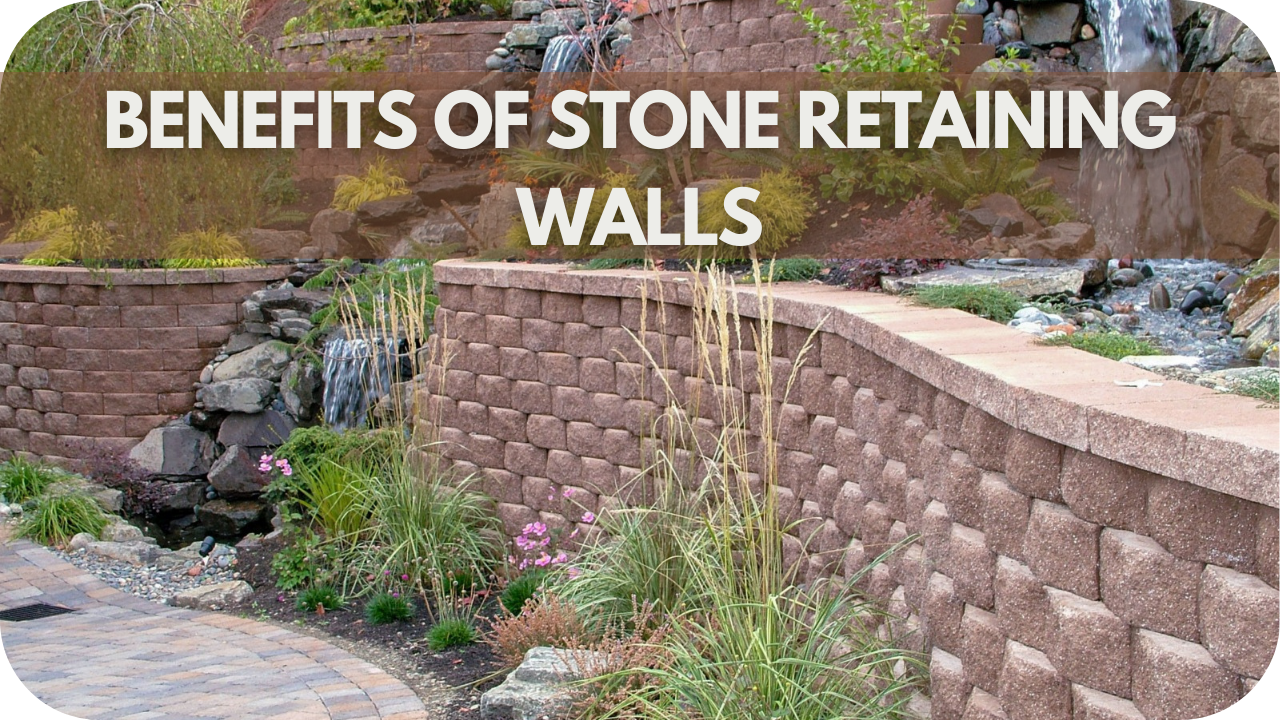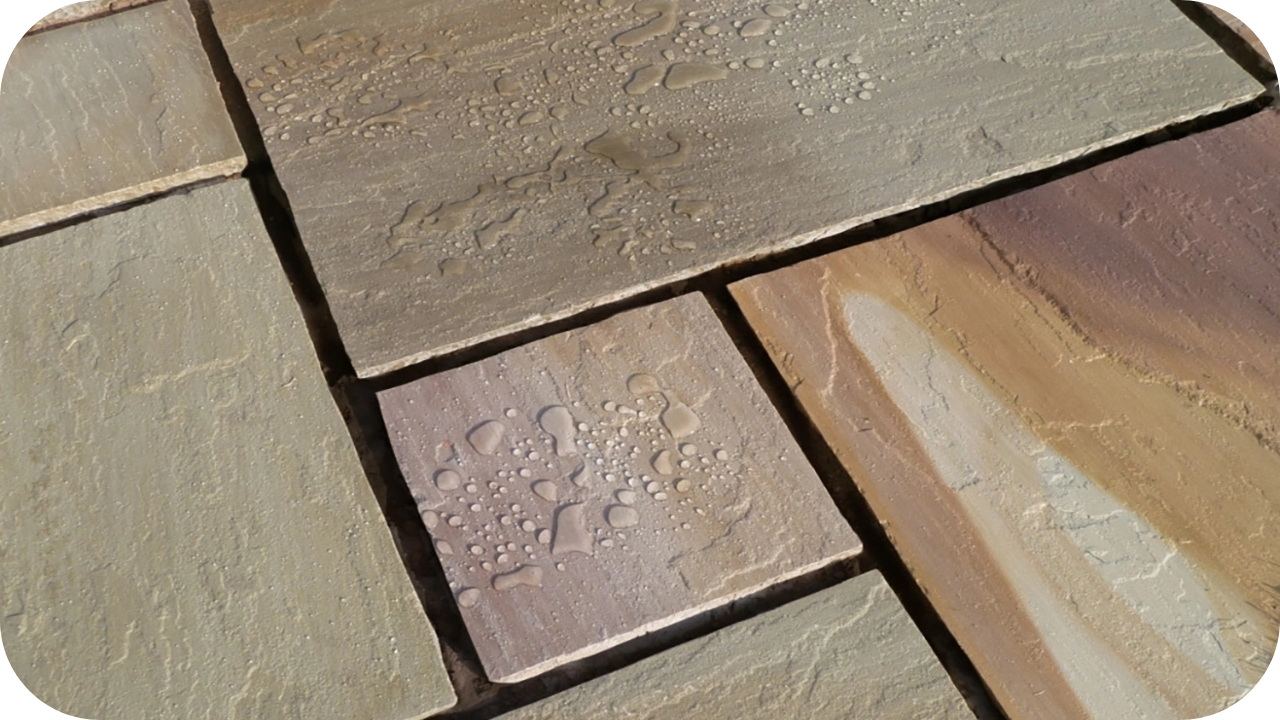
When we decided to reshape our sloped garden, we didn’t realise the transformation a stone retaining wall could bring.
Not only did it control soil erosion and add structure, but it also became a timeless feature, blending seamlessly into the landscape. From boosting curb appeal to ensuring long-lasting stability, stone retaining walls offer much more than just functionality.
Whether you want to enhance or protect your outdoor space, uncover the lasting benefits only natural stone can provide.
1. Durability and Longevity
Stone retaining walls are renowned for their exceptional durability. They provide a solution that will withstand weather, time, and wear. Unlike other materials, stone resists cracking, warping, and degradation, even under extreme conditions.
Stone’s natural strength creates a structure capable of bearing significant weight, making it ideal for holding back soil on sloped landscapes. Weather, from intense sunlight to heavy rains, barely affects its performance or appearance.
Over the decades, a stone wall has maintained its integrity and aesthetic appeal with minimal maintenance. Occasionally, minor repairs may be needed, yet these walls require far less upkeep than other materials.
2. Aesthetic Appeal and Natural Beauty
Stone retaining walls effortlessly enhance the aesthetic of any outdoor space, providing a natural elegance that few other materials can achieve.
Rich in texture and variety, stone offers a range of colours and patterns, allowing homeowners to select a style that complements their surroundings. Even as time passes, natural stone weathers beautifully, blending seamlessly with the landscape and enhancing its charm.
Each piece of stone, unique in its grain and hue, adds depth and visual interest to the wall. Stone’s timeless appeal adapts to any aesthetic vision, whether for a rustic garden or a modern outdoor design.
Unlike synthetic materials, natural stone has an organic quality that remains warm and inviting. Low-maintenance and resistant to fading, these walls retain their beauty year after year.
3. Low Maintenance Requirements
Stone retaining walls require remarkably little upkeep, making them an ideal choice for homeowners seeking a low-maintenance option.
Unlike wood or concrete, stone naturally resists decay, weathering, and pest damage, eliminating the need for frequent repairs. With their inherent durability, these walls stand resilient through changing seasons with minimal care.
Occasionally, a quick rinse or brushing may be needed to remove surface dirt, yet no intensive cleaning is required. When moss or lichen growth appears, it adds character to the stone, blending it further into the landscape.
In addition, the stone’s resistance to fading ensures it maintains its aesthetic appeal for years without special treatments or coatings. Stone walls rarely demand structural adjustments, as they retain their form exceptionally well over time.
4. Environmental Benefits
Stone retaining walls offer substantial environmental advantages, making them a sustainable choice for eco-conscious homeowners.
Naturally sourced and abundant, stone has a lower environmental impact during extraction than synthetic materials. Its durability further reduces the need for replacement, minimising waste over time.
Unlike chemically treated wood or manufactured concrete, stone does not release harmful substances into the soil or water. In addition, the thermal mass of stone helps regulate soil temperature, promoting healthier plant growth around the wall.
Over time, the stone’s natural surface can support the growth of moss or other vegetation, enhancing biodiversity in the garden. Minimal maintenance requirements also mean fewer chemicals or cleaning agents are needed, which keeps the surrounding environment free from contaminants.
5. Erosion Control and Soil Stability
Stone retaining walls provide excellent erosion control, ensuring soil stability on sloped or uneven terrains. By holding back soil, these walls prevent erosion caused by rain, wind, or runoff, preserving the integrity of your landscape.
Built to withstand the forces of nature, stone walls create a strong barrier that keeps soil from shifting, especially in areas prone to landslides or heavy rainfall. With its weight and durability, natural stone anchors the ground effectively, offering a long-term solution for stabilising hillsides.
Additionally, these walls help to direct water flow away from vulnerable areas, reducing the risk of flooding and soil displacement. As soil is held firmly in place, plant roots can establish more securely, promoting healthier vegetation and landscaping.
6. Improved Drainage
Stone retaining walls offer significant advantages in managing water flow and preventing excess moisture build-up. Unlike solid concrete walls, stone walls allow for natural drainage through their gaps, which helps prevent water from accumulating behind the wall.
This reduces the risk of waterlogged soil that can lead to erosion or damage to plants and nearby structures. The porous nature of many stone types also allows for better absorption, helping to redirect water away from critical areas.
Properly installed drainage systems, such as gravel backfills or weep holes, work in tandem with the stone, ensuring excess water is safely drained. As a result, the overall integrity of the wall remains intact, even during heavy rainfall.
With these enhanced drainage benefits, stone retaining walls not only stabilise the landscape but also protect it from water-related issues, ensuring your garden stays healthy and beautiful.
7. Customisation and Versatility
Stone retaining walls offer exceptional customisation options, making them versatile enough to suit any landscape design. Whether you prefer a modern, sleek look or a more rustic, natural aesthetic, stone can be chosen to match your vision.
Available in a wide range of colours, textures, and sizes, each stone type adds a unique character to the wall. Walls can be constructed in various shapes and heights, accommodating different levels of soil retention or design needs.
With the flexibility to incorporate curves, terraces, or straight lines, stone allows for creative and functional designs. Blending effortlessly with other landscaping elements, stone walls can complement patios, pathways, or garden beds.
8. Cost-Effectiveness Over Time
Stone retaining walls provide a cost-effective solution that proves valuable over the years. While the initial investment may be higher than some alternatives, the longevity of stone ensures fewer replacement or repair costs.
Unlike wood or concrete, which may degrade or require frequent upkeep, stone walls retain their strength and beauty with minimal maintenance. The durability of natural stone significantly reduces the need for costly repairs, saving money in the long run.
Over time, these walls maintain their structural integrity, meaning homeowners can avoid ongoing replacement expenses. Additionally, stone’s timeless appeal enhances property value, making it an investment that contributes to the overall worth of your home.
9. Increased Property Value
Stone retaining walls add significant value to properties, offering both functional and aesthetic benefits that appeal to potential buyers. A well-constructed stone wall creates a visually appealing focal point, enhancing curb appeal and setting the landscape apart.
Beyond looks, stone walls provide essential structural support, adding stability to gardens on sloped or uneven terrain—a feature that can boost property desirability. Durability and low maintenance means homeowners and future buyers alike can enjoy long-lasting benefits without frequent upkeep costs.
Because stone is a natural, high-quality material, it suggests permanence and luxury, traits often associated with higher property values. The stone’s versatility also allows it to blend with various architectural styles, making it a valuable addition to any home design.
10. Fire Resistance and Safety
Stone retaining walls provide a natural fire-resistant barrier, making them an excellent choice for landscapes in areas prone to wildfires or extreme heat. Unlike wood or other materials, stone does not burn, offering an added layer of protection for your home and garden.
In dry climates, this fire resistance is particularly beneficial, reducing the risk of spreading flames. Stone’s non-combustible nature ensures that the wall remains intact, even when exposed to high temperatures.
Additionally, stone walls can act as a buffer zone, helping to contain fires and protect nearby structures. With their ability to resist heat and fire, stone retaining walls offer peace of mind to homeowners concerned about safety. Beyond aesthetics, they deliver practical benefits, ensuring your outdoor space is not only beautiful but secure.
Conclusion
Stone retaining walls offer unmatched durability, beauty, and value, making them an investment that elevates both function and style in your landscape. Ready to transform your outdoor space? Choose stone for a timeless, low-maintenance solution that enhances property value and stability. Contact us today to find the perfect stone retaining wall for your home.
More To Explore

How to Tell If Stone Is Porous or Not
When selecting stone for your home or project, knowing whether it’s porous can make a huge difference. Porosity affects how your stone absorbs water, stains,

Split Face Stone: What It Is and When to Use It
Looking for a unique, durable material to elevate your next project? Split face stone might be the perfect choice. Known for its textured finish and


